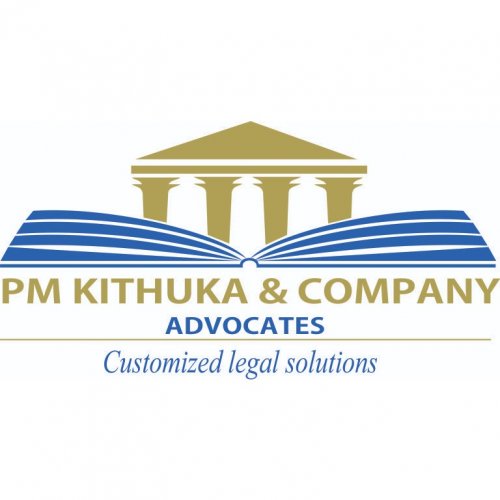Best Private Equity Lawyers in Nairobi
Share your needs with us, get contacted by law firms.
Free. Takes 2 min.
List of the best lawyers in Nairobi, Kenya
Legal guides written by Adroit Law LLP:
- Kenya Launches Digital Nomad Visa: A Gateway for Remote Workers
- Navigating the Payment System License Maze in Kenya
- Navigating the Complexities of Mining Licenses and Permits in Kenya: A Look into Artisanal and Large-Scale Operations
About Private Equity Law in Nairobi, Kenya
Private equity refers to investment in private companies that are not publicly listed on a stock exchange. These investments are usually made by private equity firms, venture capitalists, or angel investors with the aim of acquiring, growing, and eventually selling the company for a profit. In Nairobi, Kenya, the private equity sector has experienced significant growth, attracting both local and international investors interested in diverse sectors such as real estate, technology, agriculture, healthcare, and financial services.
Private equity transactions in Nairobi are typically complex and involve various legal, financial, and regulatory considerations. Lawyers play a crucial role in structuring deals, conducting due diligence, drafting and negotiating agreements, and ensuring compliance with Kenyan laws and regulations. Nairobi is a business hub in East Africa, making it a focal point for private equity activities in the region.
Why You May Need a Lawyer
Private equity transactions involve significant investments and legal complexities. Here are some common situations where you may require legal help in relation to private equity in Nairobi:
- Structuring a private equity fund or investment vehicle
- Reviewing and negotiating term sheets, shareholder agreements, and investment contracts
- Conducting due diligence on target companies
- Ensuring compliance with regulatory requirements, including approvals by regulatory authorities
- Assisting with mergers, acquisitions, or joint ventures
- Drafting exit strategies, such as buyouts or initial public offerings (IPOs)
- Resolving disputes among investors, shareholders, or company founders
- Advising on tax implications and structuring investments in a tax-efficient manner
- Protecting intellectual property and confidential information during transactions
- Advising foreign investors on local legal requirements and restrictions
Local Laws Overview
Private equity transactions in Nairobi are governed by several laws and regulatory frameworks. Understanding these is crucial for anyone involved in private equity deals. Key aspects include:
- Companies Act 2015: Governs the incorporation, management, and regulation of companies in Kenya. It outlines the duties of directors, shareholders’ rights, and corporate governance requirements.
- Capital Markets Act: Administered by the Capital Markets Authority (CMA), this law governs the conduct of investment funds and securities, including certain private equity transactions when they relate to offerings or public investments.
- Competition Act: Monitored by the Competition Authority of Kenya, it addresses issues of market competition, mergers, and acquisitions to prevent anti-competitive practices.
- Foreign Investment Regulations: These outline the requirements for foreign investors, including registration with the Kenya Investment Authority and, in some sectors, local ownership thresholds.
- Taxation Laws: Private equity transactions may attract various taxes, including capital gains tax, stamp duty, and withholding taxes. Legal advice is vital to optimize tax obligations.
- Employment and Labor Laws: Upon investment, private equity owners may need guidance on employment contracts, redundancies, or restructuring.
- Sector-Specific Regulations: Certain sectors like banking, insurance, or telecommunications require compliance with additional regulatory frameworks, often overseen by sector-specific authorities.
In all these areas, getting legal guidance helps ensure compliance and protects your investment.
Frequently Asked Questions
What is private equity?
Private equity refers to capital investment made into companies that are not publicly traded on a stock exchange. This investment is usually aimed at company growth, restructuring, or introducing innovative strategies before eventual resale.
Who regulates private equity transactions in Nairobi?
The primary regulators are the Capital Markets Authority, the Competition Authority of Kenya, and, in certain sectors, additional bodies such as the Central Bank of Kenya or Communications Authority of Kenya.
Can foreign investors participate in private equity deals in Kenya?
Yes, foreign investors can participate in private equity transactions. However, there may be sector-specific restrictions and requirements, such as minimum local shareholding and registration with the Kenya Investment Authority.
What due diligence should be conducted in private equity transactions?
Due diligence involves legal, financial, and operational checks on the target business. It includes reviewing contracts, intellectual property rights, litigation history, regulatory compliance, and financial records.
Are there any tax implications for private equity investments?
Yes, private equity transactions may trigger taxes such as capital gains tax, VAT, stamp duty, and withholding taxes. Legal advice can help structure investments to minimize tax liabilities.
What agreements are crucial in a private equity deal?
Key agreements include the shareholder agreement, investment agreement, subscription agreement, and sometimes, a management agreement. These documents clarify the rights and obligations of all parties.
How can disputes in private equity transactions be resolved?
Disputes can be settled through negotiation, mediation, arbitration, or litigation. Many agreements contain clauses specifying dispute resolution mechanisms, often with a preference for arbitration.
Is it necessary to involve a lawyer in private equity deals?
It is highly recommended to involve a lawyer to help navigate the legal complexities, protect your interests, ensure compliance, and draft or review key documents.
What is the process of exiting a private equity investment?
Exit strategies commonly include selling shares to other investors, public listing (IPO), management buyout, or trade sale to another company. The optimal strategy will depend on the investment terms and market conditions.
How long does the process take to complete a private equity deal?
The duration varies depending on deal complexity, regulatory approvals, and due diligence. Transactions may take several weeks to several months to reach completion.
Additional Resources
Several organizations and agencies in Nairobi support the private equity environment or provide additional information:
- Capital Markets Authority (CMA) - Provides regulatory guidance on investment matters
- Kenya Investment Authority (KenInvest) - Assists with foreign investor registration and incentives
- Competition Authority of Kenya - Monitors merger and acquisition compliance
- Institute of Certified Investment and Financial Analysts (ICIFA) - Offers professional standards for investment professionals
- Law Society of Kenya - Source for locating qualified advocates versed in private equity
- East Africa Venture Capital Association - Advocacy and networking for private equity participants
- Kenya Private Sector Alliance (KEPSA) - Industry voice in policy and regulatory issues
Next Steps
If you are planning to enter into a private equity transaction or require guidance on an existing investment, consider the following steps:
- Clearly define your investment objectives and expectations.
- Conduct preliminary research on the Kenyan market and any sector-specific regulations.
- Engage a qualified lawyer with experience in private equity to assess your needs, conduct due diligence, and guide you through the legal process.
- Gather and organize all necessary documentation for review by your legal advisor.
- Maintain open communication with all stakeholders to ensure transparency and avoid potential disputes.
- Stay updated on changes in Kenyan laws and regulations that may impact your investment.
Taking these steps will help you protect your interests and ensure a smooth and successful private equity transaction in Nairobi, Kenya.
Lawzana helps you find the best lawyers and law firms in Nairobi through a curated and pre-screened list of qualified legal professionals. Our platform offers rankings and detailed profiles of attorneys and law firms, allowing you to compare based on practice areas, including Private Equity, experience, and client feedback.
Each profile includes a description of the firm's areas of practice, client reviews, team members and partners, year of establishment, spoken languages, office locations, contact information, social media presence, and any published articles or resources. Most firms on our platform speak English and are experienced in both local and international legal matters.
Get a quote from top-rated law firms in Nairobi, Kenya — quickly, securely, and without unnecessary hassle.
Disclaimer:
The information provided on this page is for general informational purposes only and does not constitute legal advice. While we strive to ensure the accuracy and relevance of the content, legal information may change over time, and interpretations of the law can vary. You should always consult with a qualified legal professional for advice specific to your situation.
We disclaim all liability for actions taken or not taken based on the content of this page. If you believe any information is incorrect or outdated, please contact us, and we will review and update it where appropriate.

















